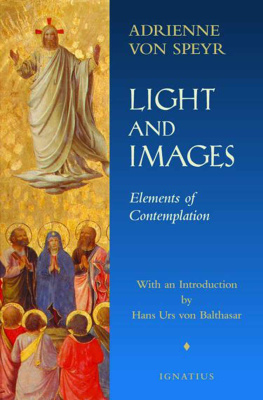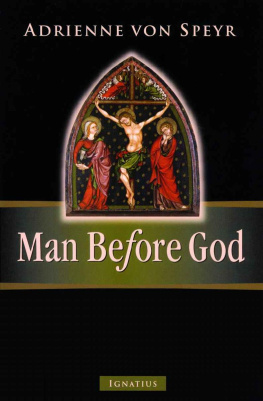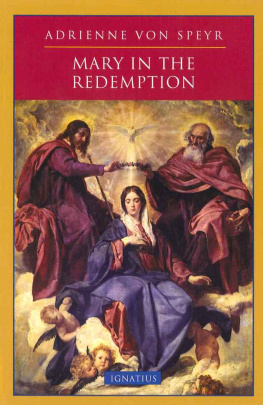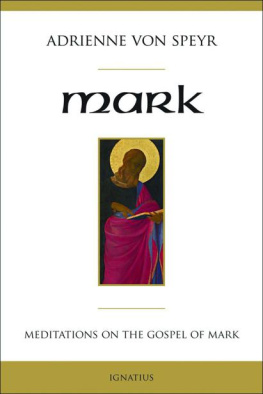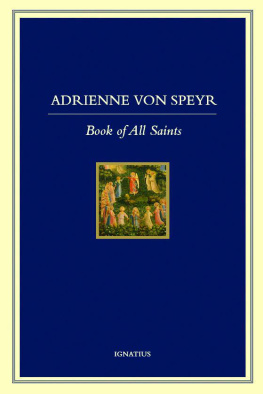THE BIRTH OF THE CHURCH
ADRIENNE VON SPEYR
The Birth of the Church
Meditations on John 18-21
TRANSLATED BY DAVID KIPP
IGNATIUS PRESS SAN FRANCISCO
Title of the German original:
Geburt der Kirche
Betrachtungen ber Kapitel 18-21 des Johannes-Evangeliums
1949 Johannes Verlag, Einsiedeln
Cover by Victoria Hoke Lane
With ecclesiastical approval
1991 Ignatius Press, San Francisco
All rights reserved
ISBN 978-0-89870-368-9
Library of Congress Catalogue Number 90-85550
Printed in the United States of America
CONTENTS
THE ARREST
18:1. When Jesus had spoken these words, he went forth with his disciples across the Kidron Valley, where there was a garden, which he and his disciples entered .
The Lord leaves the place where he had spoken with his Father. He goes forth from there. He does not, however, go alone, but in the company of his disciples. It is a company in which many things are not explicitly stated. Within it, the Lord is the one who knows everything; he has communicated his knowledge to the disciples, but they have comprehended only a little of it. Still, they have not been estranged from him through this gap in insight. They are the archetype of a true Christian communion, in which much is passed over in silence and each remains at peace even if not knowing everything about the other. For the Lord, something of the highest, most decisive sort is taking place: he has spoken with the Father, and now he goes forth. The disciples scarcely notice the enormity of this transition. They just go along with him. Thus the Lord goes with the Bride, the Church: she follows him, wordlessly, simply, in a sense colorlessly, but without revolt, in calmness in him.
They go into a garden, to a pleasant location that in no way corresponds to the event. What is now to be played out, the suffering, will be so beyond measure that no earthly scenery could reflect it.
18:2. Now Judas, who betrayed him, also knew the place; for Jesus often met there with his disciples .
The Lord chooses a place where he has often spent time with his disciples before. He does nothing out of the ordinary; he effects no transition from the everyday to the suffering. And at the same time, he shows the disciples how much they have to be, in any given situation, both trusting and on their guard. It seems like an old habit when they go into the garden. Yet today the new will come to pass. Thus man must always stay alert: any time can be the first, and any time the last. The Lord had spoken at length with the Father, and had commended all the disciples to him. That seemed to them to be a kind of confirmation and intensification of their previous Christianity; now, everything apparently slips back again into comforting everydayness. The Lord himself almost seems to lull them into security precisely by choosing the garden. And yet they ought to be able to see through the everydayness to the extraordinary thing that they have been prepared for. They have not made the most of the preparatory graces. And that, too, is a timeless situation in the Church. By going into the garden, the Lord shows her that she will never really be alert and ready, will never comprehend, as he himself experiences it, the ultimate seriousness.
Judas knows the place, he knows it so well precisely because he is a betrayer. The evil man often sees through things Christian better than does the Christian himself. His calculating forethought regarding the Churchs position often proves more correct than the forethought of the Christians. The other disciples would probably not have known where Jesus would go. Judas knows where. They are still but small in spirit; they hardly yet know the Holy Spirit. Judas, however, is filled with the evil spirit. The devil is sly and clever; he is like a mirror-reversed image of the Spirit in God. And yet the devil knows Gods intentions only from the outside; he cannot oppose them with adequate means, but only with partial, indirect, hindering means, yet never blocking ones.
18:3. So Judas, procuring a band of soldiers and some officers from the chief priests and the Pharisees, went there with lanterns and torches and weapons .
These preparations are so far from being adequate as to be, basically, absurd. The devil can work out the place where the Lord is to be found, but the means that he deploys in order to trap him are quite inappropriate. Such is the intelligence of evil: its point of departure is amazingly sharp and precise, then it immediately goes astray. The disciples, however, are intimidated by this. That one of their number who turned apostate should possess such power, could surround himself with such an assemblage, makes an impression on them. They feel that on their side is weakness and on the other side strength; if they needed means for support of the Lords cause, they could never move in with the same show of force as Judas. The spiritual and the worldly run up against one another here: a poor Church, in whose midst, however, the Lord is present, and strong enemies who lack only one thingthe weakness of the Lord.
18:4. Then Jesus, knowing all that was to befall him, came forward and said to them: Whom do you seek ?
The Lord steps forward. It is a mystery of his communion with the Church that he steps forward. Hitherto, he has not separated himself off from the disciples. Now, as something momentous is taking place, he steps forward. He detaches himself from the disciples in order to give account of himself, and also to set himself apart from the communion. When it is a matter of life and death, then, as now, the Lord steps forward. He appears. He need not do so through signs and miracles. It can be an invisible, yet effectively forward-stepping presence in the midst of the Church. Never in times of danger does he let his disciples down; he is the first to confront the danger. And every time that someone wants to strike at the Church, he first strikes the Lord. Even temptation and sin strike the Lord first: he is struck by sin even before the soul is harmed by it. The sinless Lord guides the gaze of sin toward himself; he takes it upon himself. Thus he steps forward and creates a distance between himself and the Church. For the disciples, the consequences of this are shaming. They will never be able to boast of having gone with him at the decisive moment. It will always be the Lord who, representatively, did everything alone. And yet, precisely by stepping forward as an individual, he imparts cohesiveness to the disciples. Through his being thrown into relief, they, too, stand out in relief; we see who they are and what unites them: they are sinners and they are redeemed.
The Lord knows what the persecutors are after. Nevertheless, he has to put the question: Whom do you seek ? He requires the quite simple, quite plain answer. It is not enough for him to step forward. He wants to show that he is evading nothing. He wants to give evidence of his total consent to what is to come. His enemies fail to understand why he does not try to conceal himself in the crowd instead, why he steps forward almost challengingly and even questions them. They can have no idea that this question, which the Lord directs to them and, in particular, to the betrayer, is simultaneously a final reinforcement of the vow that he has taken before the Father And both hear the question: Judas hears it as if it were the question of one who is ignorant and unsuspecting; the Father, however, hears it as the sealing of their pact. It is like a renewal of a vow, a strengthening of the validity of something that was agreed, the sign of consummate loyalty. At the same time, it makes manifest how unexpected the ways of loyalty and obedience can be and how little the bystanders are able to see through to the implicit obedience that can inhere in an action. Even to the disciples, the question must sound like a provocation that can only aggravate the precarious situation. For the Lord, it is the befitting thing: the question to the betrayer and the answer to the Father.
Next page







